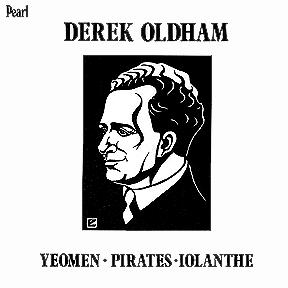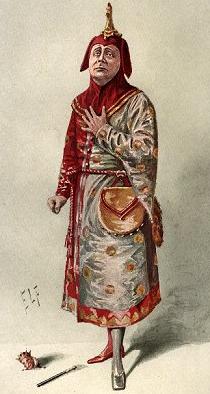G&S Vintage Compilations of Oldham/Lytton/Workman
Derek Oldham: Yeomen, Pirates, Iolanthe
 Pearl GEM-125 |
This compilation contains excerpts from three complete sets on which tenor Derek Oldham appeared: Yeomen, Iolanthe and Pirates. Derek Oldham had numerous stints with D'Oyly Carte in the 1920s and '30s. He was the best, and certainly the most prolific, tenor to record for them during this period. He died in 1968, and this 1969 issue was probably done as a memorial. Contents are as follows:
- Yeomen
-
"Is Life a Boon?"
"Dids't thou Not O Leonard Meryll?"
"To Thy Fraternal Care"
"Free From His Fetters Grim"
"A Man Who Would Woo a Fair Maid"
"When a Wooer Goes a-Wooing"
"All Thought of Leonard Meryll Set Aside" - Iolanthe
-
"Of All the young ladies I know"
"Spurn Not the Nobly Born"
"Though Per'aps I may incur your blame"
"If you go in" - Pirates
-
"O False One"
"Oh, Is there not one maiden breast"
"All is prepared"..."Ah, Leave me not to pine"
| Date | Label | Format | Number |
|---|---|---|---|
| 1973? | Pearl | Mono LP | GEM 125 |
C. H. Workman's Gilbert and Sullivan
 C. H. Workman, in a Vanity Fair Portrait |
Charles Herbert Workman was one of the great "patter comedians" of the D'Oyly Carte Opera Company. He created the small role of Ben Hashbaz in the original production of The Grand Duke, and after several more years in small parts, he became the principal comedian in D'Oyly Carte's first touring company. He continued to tour until 1906, when he played the comic parts in the repertory season that Gilbert directed at the Savoy. He was also the principal comedian in the second repertory season, 1908-9, which Gilbert also directed. Workman was one of just a few patter baritones who played the parts under Gilbert and made a significant number of recordings.
Ironically, the recordings came about because of a quarrel between Workman and the librettist. After the 1908-9 repertory season, Workman leased the Savoy Theatre and became an actor-manager. He produced three operas in the 1909-10 season, all of them failures, including the Gilbert-Edward German collaboration Fallen Fairies. Gilbert insisted, over both German's and Workman's concerns, that his protegée Nancy McIntosh play one of the leading roles. Miss McIntosh did poorly and Workman fired her a week after the opening, for which Gilbert never forgave him.
Workman had intended to produce a season of Gilbert and Sullivan at the Savoy, including what would have been the first revival of Ruddigore, but Gilbert denied Workman the right to appear in any of his operas. With what amounted to his only dependable source of income cut off, Workman went into the recording studio and recorded ten patter songs for Odeon. About a year later, after a successful run in The Chocolate Soldier at the Lyric Theatre, he recorded some additional sides, including numbers from Utopia Limited and The Rose of Persia that he had never played on stage.
The quality of these recordings varies, with the later ones being generally better than the earlier ones. In his recording of "My name is John Wellington Wells," for example, he fluffs one of the verses. (Why it wasn't recorded again is hard to figure.) His Nightmare Song, however, is one of the best on record—taken at an unbelievably fast pace, to fit on one side. His "Willow, tit-willow" includes a cadenza, almost certainly authentic, which later D'Oyly Carte patter men dropped, and which appears on no other recording of the work.
This compilation was issued only on LP, although several Workman tracks appear on the CD re-issue of The Art of the Savoyard, and twelve Workman tracks are featured on the Symposium CD, Sir Arthur Sullivan Sesquicentenial Commemorative Issue, Volume 2.
| Side 1 | Side 2 |
|---|---|
|
"When I, good friends" (Trial By Jury) "My name is John Wellington Wells" (Sorcerer) "When I was a lad" (Pinafore) "I am the very model of a modern Major-General" (Pirates) "Sighing softly to the river" (Pirates) "If you're anxious for to shine" (Patience) "The law is the true embodiment" (Iolanthe) "When I went to the bar" (Iolanthe) "When you're lying awake" (Iolanthe) |
"If you give me your attention" (Princess Ida) "Whene'er I spoke sarcastic joke" (Princess Ida) "On a tree by a river" (Mikado) "I have a song to sing, O," with Elsie Spain (Yeomen) "I've jibe and joke" (Yeomen) "A private buffoon" [four verses only] (Yeomen) "In enterprise of martial kind" (Gondoliers) "I stole the prince" (Gondoliers) "First you're born" (Utopia, Limited) "There was a small street arab" (The Rose of Persia) |
| Date | Label | Format | Number |
|---|---|---|---|
| 1974? | Pearl | LP | GEM135 |
The Art of Henry Lytton
This compilation, which was issued only on LP, features a variety of recordings by Henry Lytton, who is best known as a D'Oyly Carte patter baritone but made, sadly, relatively few G&S recordings; about two-thirds of the selections on this disc are non-G&S. They are as follows:
| Side 1 | Side 2 |
|---|---|
|
"The laughing song" (1905) "He was a sailor" "The dotlet of my eye" "Two little chicks" "Me and Mrs. Brown" "Quarrelling" "Peace, peace" "Everybody's awfully good to me" "When I marry Amelia" "Archie, Archie" "By the shore of the Mediterranean" "My cosy corner girl" "Make it up" "You'd better ask me" |
"Four jolly sailormen" "Imagination" "The Yeomen of England" The Curate's Song "None shall part us" "If you give me your attention" "Whene'er I poke sarcastic joke" "I've got a little list" "Tit willow" "In enterprise of martial kind" "When I was a lad" |
| Date | Label | Format | Number |
|---|---|---|---|
| 1982 | Pearl | LP | GEM197 |
